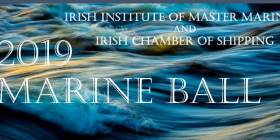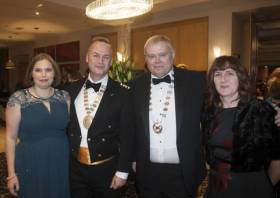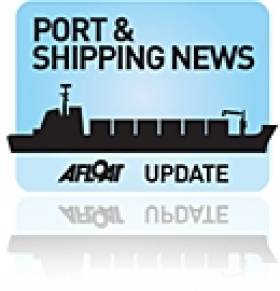Displaying items by tag: Irish Chamber of Shipping
The Irish Institute of Master Mariners and the Irish Chamber of Shipping's annual Marine Ball is to be held this week on Saturday, 16th November in the Grand Hotel, Malahide, Co. Dublin.
This year's Marine Ball Black Tie evening will provide a great social event to catch up with old friends and also an opportunity to make new friends while networking. A drinks reception begins at 1900hrs followed by music and fine dining with wine sponsored by Martek.
To book tickets for the 2019 Marine Ball click here and for further information email: [email protected]
The Irish Institute of Master Mariners (see IIMM's website) is a non-political organisation promoting safe, efficient & professional maritime operations globally.
The Institute membership consists of seafarers who are professionally qualified ship navigation officers up to and including the rank of Master Mariner, the globally recognised professional qualification required to command large seagoing vessels in international waters.
Stronghold of Marine Connections Celebrated at Ball in Arklow
#MaritimeBall - From around the country over 160 people were treated to some top class hospitality as the Irish Institute of Master Mariners and the Irish Chamber of Shipping held the Marine Ball in the Arklow Bay Hotel, writes The Wickow People.
It's four years since the ball was last held in Arklow and Mary O'Neill, vice president of the Irish Chamber of Shipping, said it is one of the biggest events of the year. 'Arklow has always had a strong connection with the mariners, so it was great to honour the town,' said Mary.
There was several guest of honours at the event, including Commodore Hugh Tully from the Irish Navy; Conor Mowlds, director of the National Maritime College of Ireland; Liam Lacey, director of the Irish Maritime Development Office; and Michael Kingston, Global Maritime Lawyer of the Year 2016.
Speaking at the event, Cllr Tommy Annesley, cathaoirleach of the Arklow Municipal District, congratulated everyone for their hard work and said that it was 'great to see the local Maritime of Ireland branch to get together with the national organisation.'
As previously reported on Afloat last week, Arklow Shipping's newbuild Arklow Clan, a short-sea trader made a brief anchorage call offshore of the shipowners homeport.
Afloat's shipping correspondent, Jehan Ashmore will have more to report on the maritime heritage of the Co. Wicklow town that has strongly shaped the nation's merchant shipping fleet past and present.
Another key date in the Irish merchant marine calendar is tomorrow's (19 Nov.) annual National Commemoration for Irish Seafarers, which takes place at the memorial monument on City Quay, Dublin from 12 noon.
#ChamberOnboardCIT - The Irish Chamber of Shipping are pleased to announce that they have been successfully represented on the Cork Institute of Technology's Governing Body.
CIT's Governing Body chairman, Mr. Bob Savage on behalf of the Minister for Education and Skills, Ms. Jan O' Sullivan confirmed the appointment of Captain Dave Hopkins.
Speaking on the news, Mr John Toner, President of the Irish Chamber of Shipping said "On behalf of the Council of the Irish Chamber of Shipping, I would like to congratulate Dave Hopkins on his appointment and also to congratulate and thank Conor Mowlds on successfully proposing representation from our industry in recognition of the great contribution that NMCI has to CIT."
Mr Toner added "It is a very significant step in our progress to actively involve the shipping industry in the key elements of our support structures and services within Ireland. It is important not just for our members but for shipping companies intending to set up in Ireland to know that there is yet another close involvement of the industry with key Maritime education providers."
The Governing Body, under the terms of the Institutes of Technology Act (1992 - 2006), shall manage and control the affairs of the Institute and shall perform the functions conferred on the Institute. It is, therefore, the authority established by law to govern the Institute.































































